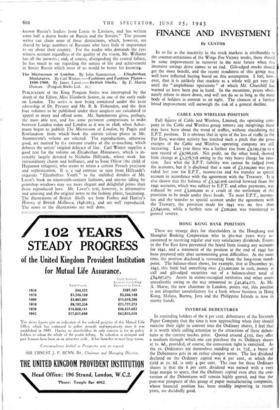The Russians. By Albert Rhys Williams. (Harrap. 75. 6d.)
IF Mr. Williams possessed mental calibre to match his opportunities he could have written a first-class book. He has travelled in post- revolutionary Russia a good deal more freely and extensively than is usual ; he speaks various ' languages and dialects subsidiary to Russian ; he likes talking to people. He has read :copiously, and he has an enquiring .mind. On the face of it one might say that this was a knowledgable book .spdilt by -_an inferior style. In fact, it is not even that. 'Knowledge is-more than the collected results of personal observatian,_and ,Mr. Williams'. personal observation is not illumined by understanding of the Russians,' but fogged' by his own political emotions, which have nothing to do with these long- suffering, people. Like almost.everybody. else, he has missed the point of the Revolution because, like almost everybody else (Sir John May- nard brilliantly excepted) he sees it as a political act -instead of a mentairelease..Presumably this comes from ignorance of-Russta before the Revolution, sanhined with the Westerner's_emo.tional. approach to Socialism. We are excited by the idea of a Socialist State (either for or against it) because it is-something quite strange to us, and we blithely assume that the Russians must share our excitement. To the Russian peasants, age-long Communists banded against the hostile elements in the shadow of-God and the :Tsar,- no idea could be more familiar. .The Russians are excited, too, not by the Communism of Marx and Lenin, but -by the dramatised philosophy of the dialectic which has changed " thorn by - substituting for -a --negative .attitude to life an extremely positive one. That is the true revolution. It is only fair to add that Mr. Williams, to_quote his publishers, ", wssian eye-witness _of the -Revolution in Russia, -and has .lived in that country for thirteen of -the succeeding twenty-five years. He has
• known Russia's leaders from Lenin to Litvinov, and has written some half a dozen books on Russia and the 'Soviets." The present writer can claim none of these distinctions, which, however, are shared by large numbers of Russians who have little of importance to say about their country. For the reader who demands the eye- witness account regardless of the quality of the vision, Mr. Williams has all the answers ; and, of course, disregarding the central fallacy, he has much to say regarding the nature of life and achievement in Soviet Russia which most of us would be better for knowing.































 Previous page
Previous page